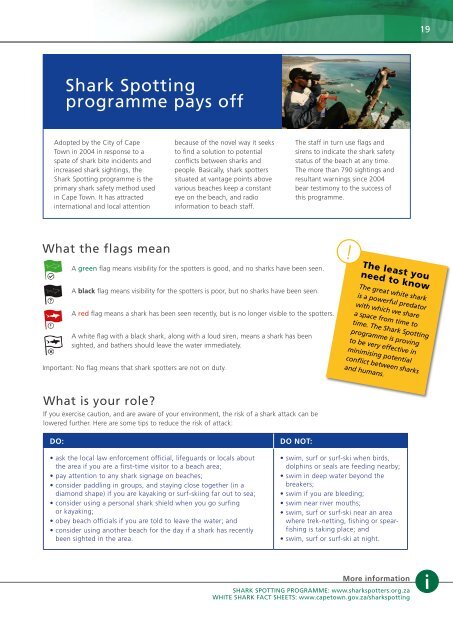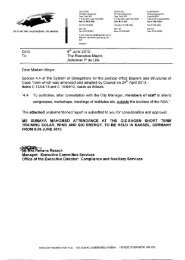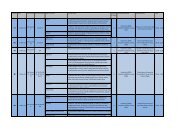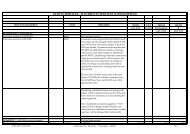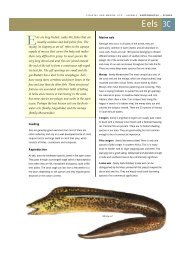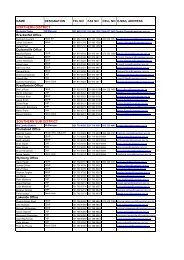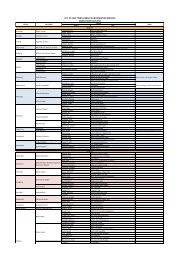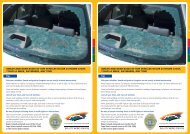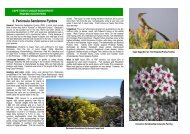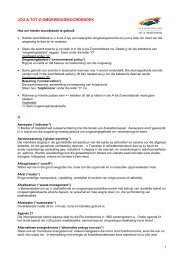Our coastline – priceless! - City of Cape Town
Our coastline – priceless! - City of Cape Town
Our coastline – priceless! - City of Cape Town
You also want an ePaper? Increase the reach of your titles
YUMPU automatically turns print PDFs into web optimized ePapers that Google loves.
Shark Spotting<br />
programme pays <strong>of</strong>f<br />
Adopted by the <strong>City</strong> <strong>of</strong> <strong>Cape</strong><br />
<strong>Town</strong> in 2004 in response to a<br />
spate <strong>of</strong> shark bite incidents and<br />
increased shark sightings, the<br />
Shark Spotting programme is the<br />
primary shark safety method used<br />
in <strong>Cape</strong> <strong>Town</strong>. It has attracted<br />
international and local attention<br />
What the flags mean<br />
because <strong>of</strong> the novel way it seeks<br />
to find a solution to potential<br />
conflicts between sharks and<br />
people. Basically, shark spotters<br />
situated at vantage points above<br />
various beaches keep a constant<br />
eye on the beach, and radio<br />
information to beach staff.<br />
A green flag means visibility for the spotters is good, and no sharks have been seen.<br />
A black flag means visibility for the spotters is poor, but no sharks have been seen.<br />
A red flag means a shark has been seen recently, but is no longer visible to the spotters.<br />
A white flag with a black shark, along with a loud siren, means a shark has been<br />
sighted, and bathers should leave the water immediately.<br />
Important: No flag means that shark spotters are not on duty.<br />
What is your role?<br />
If you exercise caution, and are aware <strong>of</strong> your environment, the risk <strong>of</strong> a shark attack can be<br />
lowered further. Here are some tips to reduce the risk <strong>of</strong> attack:<br />
DO: DO NOT:<br />
• ask the local law enforcement <strong>of</strong>ficial, lifeguards or locals about<br />
the area if you are a first-time visitor to a beach area;<br />
• pay attention to any shark signage on beaches;<br />
• consider paddling in groups, and staying close together (in a<br />
diamond shape) if you are kayaking or surf-skiing far out to sea;<br />
• consider using a personal shark shield when you go surfing<br />
or kayaking;<br />
• obey beach <strong>of</strong>ficials if you are told to leave the water; and<br />
• consider using another beach for the day if a shark has recently<br />
been sighted in the area.<br />
The staff in turn use flags and<br />
sirens to indicate the shark safety<br />
status <strong>of</strong> the beach at any time.<br />
The more than 790 sightings and<br />
resultant warnings since 2004<br />
bear testimony to the success <strong>of</strong><br />
this programme.<br />
The great white shark<br />
is a powerful predator<br />
with which we share<br />
a space from time to<br />
time. The Shark Spotting<br />
programme is proving<br />
to be very effective in<br />
minimising potential<br />
conflict between sharks<br />
and humans.<br />
• swim, surf or surf-ski when birds,<br />
dolphins or seals are feeding nearby;<br />
• swim in deep water beyond the<br />
breakers;<br />
• swim if you are bleeding;<br />
• swim near river mouths;<br />
• swim, surf or surf-ski near an area<br />
where trek-netting, fishing or spearfishing<br />
is taking place; and<br />
• swim, surf or surf-ski at night.<br />
More information<br />
SHARK SPOTTING PROGRAMME: www.sharkspotters.org.za<br />
WHITE SHARK FACT SHEETS: www.capetown.gov.za/sharkspotting<br />
19<br />
! The least you<br />
need to know<br />
i


